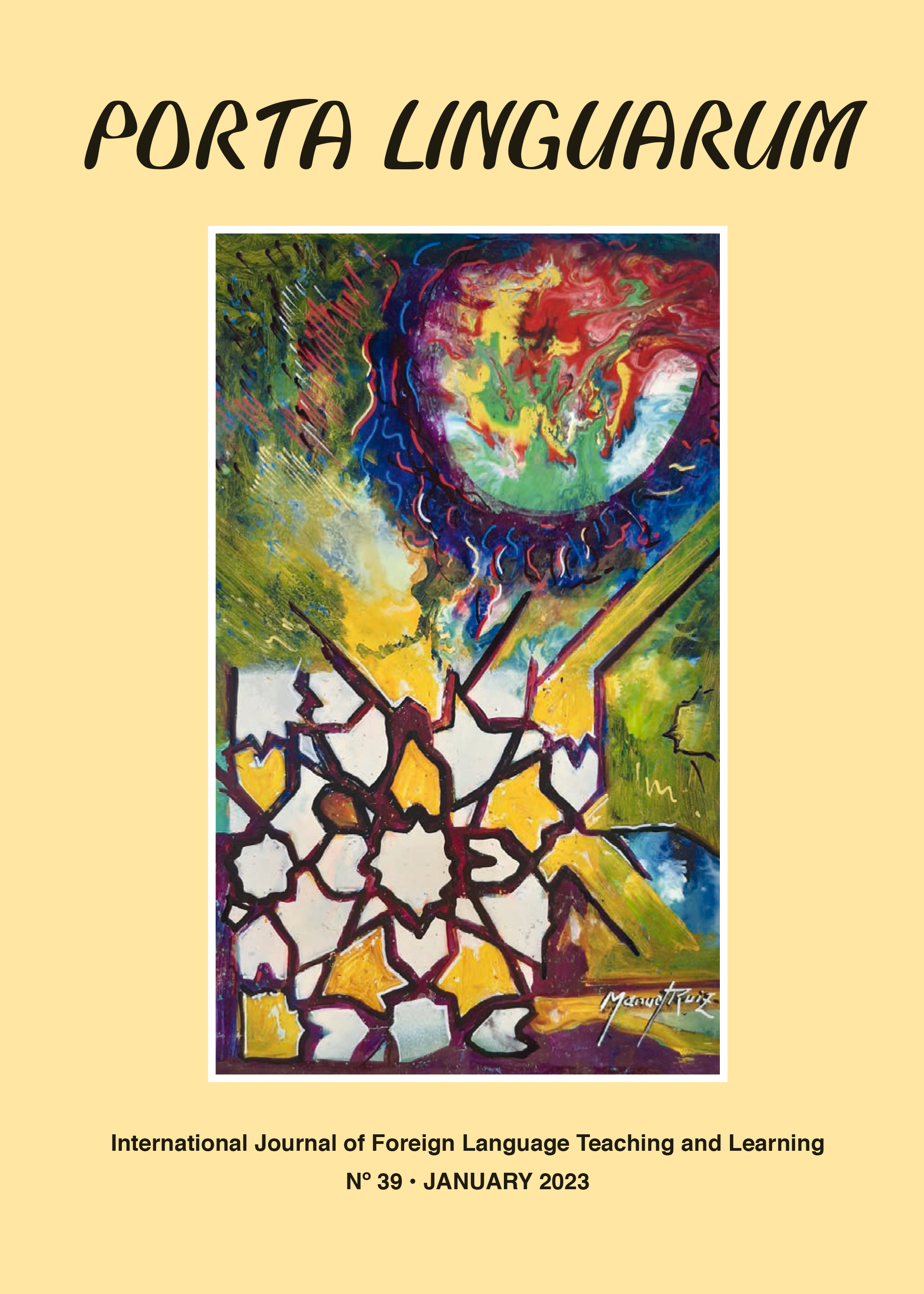Test-taking strategy use by Chinese young EFL learners in an authentic international standardized English test
DOI:
https://doi.org/10.30827/portalin.vi39.24390Keywords:
Chinese young EFL learners, test-taking strategy use, authentic international standardized English test, Cambridge Young Learners English Test, a mixed-methods approachAbstract
The current study examined language test-taking strategies used by Chinese young learners of English as a foreign language (EFLs) in an authentic international standardized English test–Cambridge Young Learners English Test: Flyers Test. It adopted a mixed-methods approach: the quantitative part was a survey administered to 138 participants, and the qualitative part consisted of think-aloud sessions and retrospective interviews with six participants (three were high-achievers and three were low-achievers). The quantitative results show that in general, children adopted metacognitive test-taking strategies more frequently than cognitive test-taking strategies irrespective of language skills; and the high-achievers used test-taking strategies more frequently than their low-achievers. The two-way interaction effects between levels of test performance ☓ strategy type and between language skills ☓ strategy type were also significant. The qualitative results demonstrate that the high-achievers not only used a broader range of cognitive strategies than low-achievers, they also used the same metacognitive strategies at an in-depth level and in a more sophisticated way than low-achievers. The results of the study suggest that expanding Chinese young EFL learners’ repertoire of test-taking strategies and modeling desirable ways of using strategies may help them improve their test-taking strategy use.
Downloads
References
Bachman, L. F. (1990). Fundamental considerations in language testing. Oxford University Press.
Bachman, L. F. (2000). Modern language testing at the turn of the century: Assuring that what we count counts. Language Testing, 17(1), 1-42. https://doi.org/10.1177/026553220001700101
Bachman, L. F., & Palmer, A. S. (2010). Language assessment in practice. Oxford University Press.
Bachman, L., & Cohen, A. (1998). Language testing – SLA interfaces: An update. In L. Bachman & A. Cohen (Eds.), Interfaces between second language acquisition and language testing research (pp. 1-31). Cambridge University Press.
Cohen, A. D. (2007). The coming of age of research on test-taking strategies. In J. Fox, M. Weshe, D. Bayliss, L. Cheng, C. Turner, & C. Doe (Eds.), Language testing reconsidered (pp. 89-111). Ottawa University Press.
Cohen, A. D. (2014). Strategies in learning and using a second language. Routledge.
Cohen, A. D., & Macaro, E. (Eds.). (2007). Language learner strategies: Thirty years of research and practice. Oxford University Press.
Creswell, J. W., & Poth, C. N. (2017). Qualitative inquiry and research design: Choosing among five approaches (4th ed.). Sage.
Dawadi, S. (2020). Parental involvement in national EFL test preparation. RELC Journal 51(3), 427-439. https://doi.org/10.1177/0033688219848770
Doe, C., & Fox, J. (2011). Exploring the testing process: Three test takers’ observed and reported strategy use over time and testing contexts. Canadian Modern Language Review, 67(1), 29-54. https://doi.org/doi:10.3138/cmlr.67.1.029
Grabe, W. P., & Stoller, F. L. (2013). Teaching and researching: Reading. Routledge.
Gu, L., & So, Y. (2017). Strategies used by young English learners in an assessment context. In M. Kim & Y. Butler (Eds.), English language proficiency assessments for young learners (pp. 118-135). Routledge.
Han, F. (2018). Strategic processing of Chinese young English language learners in an international standardized English language test. Frontiers in Psychology. https://doi.org/10.3389/fpsyg.2018.01020
Jackson, D. O. (2020). Working memory and second language development: A complex, dynamic future? Studies in Second Language Learning and Teaching 10(1), 89-109. https://doi.org/10.14746/ssllt.2020.10.1.5
Macaro, E. (2006). Strategies for language learning and for language use: Revising the theoretical framework. The Modern Language Journal, 90(3), 320-337. https://doi.org/10.1111/j.1540-4781.2006.00425.x
McNamara, T., Knoch, U, Fan, J., & Rossner, R. (2019). Fairness, justice & language assessment. Oxford University Press.
Nikolov, M. (2006). Test-taking strategies of 12-and 13-year-old Hungarian learners of EFL: why whales have migraines. Language Learning, 56(1), 1-51. https://doi.org/10.1111/j.0023-8333.2006.00341.x
Nikolov, M., & Timpe-Laughlin, V. (2021). Assessing young learners’ foreign language abilities. Language Teaching, 54(1), 1,37. https://doi.org/10.1017/S0261444820000294
O’Malley, J., & Chamot, U. (1990). Learning strategies in second language acquisition. Cambridge University Press.
Oxford, R. (2016). Teaching and researching language learning strategies. Longman.
Phakiti, A. (2003a). A closer look at gender and strategy use in L2 reading. Language Learning, 53(4), 649-702. https://doi.org/10.1046/j.1467-9922.2003.00239.x
Phakiti, A. (2003b). A closer look at the relationship between cognitive and metacognitive strategy use to EFL reading achievement test performance. Language Testing, 20, 20-56. https://doi.org/10.1191/0265532203lt243oa
Phakiti, A. (2006). Modeling cognitive and metacognitive strategies and their relationships to EFL reading test performance. Melbourne Papers in Language Testing, 1, 53-96.
Phakiti, A. (2008a). Construct validation of Bachman and Palmer’s (1996) strategic competence model over time in EFL reading tests. Language Testing, 25, 237-272. https://doi.org/10.1177/0265532207086783
Phakiti, A. (2008b). Strategic competence as a fourth-order factor model: A structural equation modeling approach. Language Assessment Quarterly, 5(1), 20-42. ttps://doi.org/10.1080/15434300701533596
Phakiti, A. (2016). Test-takers’ performance appraisals, appraisal calibration, and cognitive and metacognitive strategy use. Language Assessment Quarterly, 13(2), 75-108. https://doi.org/10.1080/15434300701533596
Purpura, J. E. (1997). An analysis of the relationships between test-takers’ cognitive and metacognitive strategy use and second language test performance. Language Learning, 47, 289-325. https://doi.org/10.1111/0023-8333.91997009
Purpura, J. E. (1998). Investigating the effects of strategy use and second language test performance with high- and low-achieving test-takers: A structural equation modeling approach. Language Testing, 15, 333-379.
Purpura, J. E. (1999). Learner strategy use and performance on language tests: A structural equation modeling approach. Cambridge University Press.
Purpura, J. E. (2016). Second and foreign language assessment. The Modern Language Journal, 100(S1), 190-208. https://doi.org/10.1111/modl.12308
Radwan, A. A. (2011). Effects of L2 proficiency and gender on choice of language learning strategies by university students majoring in English. Asian EFL Journal, 13(1), 115-163.
Song, X. (2005). Language learner strategy use and English proficiency on the Michigan English Language Assessment Battery. Spaan Fellow Working Papers in Second or Foreign Language Assessment, 3, 1-26.
Vandergrift, L. (2003). Relationships among motivation orientations, metacognitive awareness and proficiency in L2 listening. Applied Linguistics, 26, 70-89. https://doi.org/10.1093/applin/amh039
Wang, Z. & Han, F. (2017). Metacognitive knowledge and metacognitive control of writing strategy between high- and low-performing Chinese EFL writers. Theory and Practice in Language Studies, 7(7), 523-532. http://doi.org/10.17507/tpls.0707.04



















